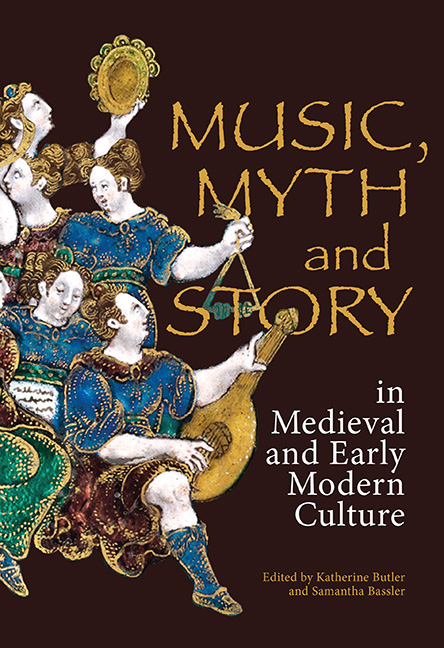Book contents
- Frontmatter
- Contents
- List of Illustrations
- List of Contributors
- Editors’ Note
- Introduction
- I MYTH IN MEDIEVAL MUSIC THEORY AND PHILOSOPHY
- 1 Music and the Myth of Apollo's Grove
- 2 The Consolation of Philosophy and the ‘Gentle’ Remedy of Music
- 3 And in England, There are Singers: Grafting Oneself into the Origins of Music
- II ICONOLOGIES OF MUSIC AND MYTH
- III MYTHS IN RENAISSANCE PHILOSOPHIES OF MUSIC
- IV MYTH AND MUSICAL PRACTICE
- V NARRATIVES OF PERFORMANCE
- VI MYTH AND MUSIC AS FORMS OF KNOWLEDGE
- VII RE-IMAGINING MYTHS AND STORIES FOR THE STAGE
- Bibliography
- Index
- Studies in Medieval and Renaissance Music
2 - The Consolation of Philosophy and the ‘Gentle’ Remedy of Music
from I - MYTH IN MEDIEVAL MUSIC THEORY AND PHILOSOPHY
Published online by Cambridge University Press: 24 October 2019
- Frontmatter
- Contents
- List of Illustrations
- List of Contributors
- Editors’ Note
- Introduction
- I MYTH IN MEDIEVAL MUSIC THEORY AND PHILOSOPHY
- 1 Music and the Myth of Apollo's Grove
- 2 The Consolation of Philosophy and the ‘Gentle’ Remedy of Music
- 3 And in England, There are Singers: Grafting Oneself into the Origins of Music
- II ICONOLOGIES OF MUSIC AND MYTH
- III MYTHS IN RENAISSANCE PHILOSOPHIES OF MUSIC
- IV MYTH AND MUSICAL PRACTICE
- V NARRATIVES OF PERFORMANCE
- VI MYTH AND MUSIC AS FORMS OF KNOWLEDGE
- VII RE-IMAGINING MYTHS AND STORIES FOR THE STAGE
- Bibliography
- Index
- Studies in Medieval and Renaissance Music
Summary
IN The Myths We Live By, Mary Midgley addresses the tendency to divide science from myth (and fact from story) by showing that science is not a disinterested enterprise, but an ‘ever-changing imaginative structure of ideas by which scientists continue to connect, understand and interpret’. In particular she addresses how certain concepts within scientific discourse act not just ‘as passive pieces of apparatus like thermostats’, but exert an influence on the materials they examine. Her ultimate point is that ‘truth’ is situated in and shaped by frames of experience and modes of reference. A precedent of Midgley's view is found directly in Ludwig Wittgenstein's ‘language-games’, but extends across history, including Martin Heidegger's understanding of language as the ‘house of being’, Herder's ‘constitutive’ view of language, and Plato's theory that world disclosure depends upon epistemic perspective.
Drawing upon Plato and the Greek tradition, Boethius's Consolation of Philosophy brings into sharp focus the fluid and narrative character of reality pointed out by Midgley, as well as the broader validity of her case. As we shall see, the Consolation is a form of autobiography and as such can be seen as a performative exercise through which Boethius comes to an understanding of himself. In the light of the situation he finds himself in, Boethius struggles to tell a story that makes sense of the events in his life. He requires the intervention of Lady Philosophy, who reveals their coherence. Importantly, the therapeutic mechanisms that Lady Philosophy brings to bear in her dialogue with Boethius rely upon an ‘imaginative pattern’ that sees God as creator and source, and the world's existence as dependent on order and harmony.
This manifests not only in terms of the arguments that Lady Philosophy sets out but underpins the role of music, which is decisive to the re-telling; music is the principle of harmony and permeates every aspect of the created order, including Boethius, whom it acts upon to re-order and re-harmonise. Ultimately, however, music gathers force in the Consolation not simply as a concept within an imaginative structure, but as an action, a means of being in the world. As such, music facilitates world-making: the process through which humans attempt to make sense of themselves and the environment in which they are situated.
- Type
- Chapter
- Information
- Publisher: Boydell & BrewerPrint publication year: 2019



